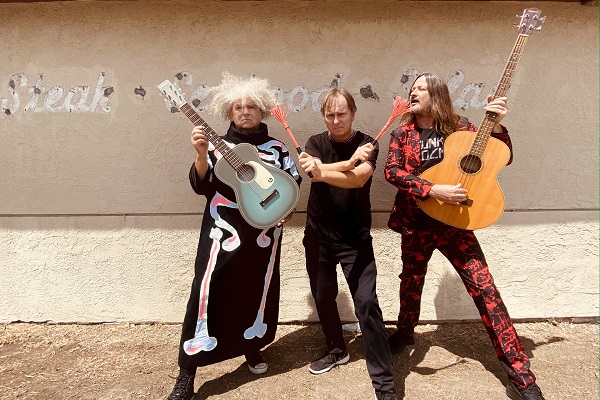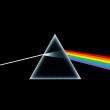The Melvins, Interview – Buzz Osborne on Going Acoustic and the Future of Music

The Melvins – Story by Anne Erickson, photo by Bob Hannam
Buzz Osborne of The Melvins joins Anne Erickson to discuss the band’s all-acoustic album, “Five Legged Dog,” their overarching influence on music, Kurt Cobain and more in this in-depth interview
Buzz Osborne and The Melvins have been an unwavering force in music since their genesis in the early-1980s. They sound distinct and unusual- and no other band has ever come close to replicating the group’s singular sound.
The Melvins are known for influencing a string of blockbuster grunge bands, including Nirvana, Pearl Jam and Soundgarden. They’ve done it all, but in their nearly 40 years together, The Melvins haven’t released an acoustic album- until now.
The band releases a massive musical collection, “Five Legged Dog,” on Friday (Oct. 15), featuring 36 Melvins songs, newly recorded, that are completely acoustic. Even unplugged, the set captures the band’s legendary high-energy delivery and quirky aura.
Buzz Osborne, also known as King Buzzo, caught up with Anne Erickson of Audio Ink Radio to discuss the new album, the band’s history in the ’80s and ’90s Seattle music scene, the state of popular music and more. Read the Buzz Osborne interview below, listen via the YouTube player and hear it via the Audio Ink Radio show on Apple Podcasts here and Spotify here. For more on Osborne, visit The Melvins’ website.
Anne Erickson: Congratulations on your new release, “Five Legged Dog.” This set is huge, with 36 songs, newly recorded. It’s also The Melvins’ first all-acoustic collection. What inspired this idea?
Buzz Osborne: Well, we’re sitting here during the pandemic with no touring and nothing, and we figured, we don’t know how we’re going to be touring when we get done, so maybe we’d have to do acoustic. So, we wanted to have something that we could tour on if and when this thing ever starts over again. That was the main thing, and then once we got into it, we realized, one album, no. Two albums- let’s do something big. Not three, how about four full albums. That’s what we did.
The thing that struck me is that even though it’s an acoustic record, it has more energy than I hear on most acoustic material.
Well, especially punk rockers are metallers, whenever they pick up a guitar, they end up sounding like some bad version of James Taylor, or they do countrified-type stuff. As much as I like that kind of stuff, if I want to listen to James Taylor, I’ll just listen to James Taylor. I think they kind of missed the point. When I did my first acoustic record six or seven years ago, This Machine Kills Artists, I was really inspired by something I’d seen when I was way younger, or heard, which was a record by Pete Townshend he did live called “Secret Policeman’s Ball.” He played “Won’t Get Fooled Again,” “Drowned” and “Pinball Wizard” on acoustic, and it sounded really great, and I was just amazed at how great it sounded. I bought that record and loved those versions so much, it never kind of never left my head. Just because he’s playing acoustic doesn’t take the strength away from the songs. So, that was the main inspiration for how we were going to do it. I mean, I love that stuff so much. I love The Who. They’re one of my favorite bands ever. I realize, you can take these songs if they’re good, and they can be good no matter how you do it.
Tell me how your acoustic version of The Rolling Stones’ “Sway” came together.
We played for a while with two bass players, Steven and Jeff Pinkus, and I came up with the idea that I wanted to cover that song and have Steven sing it, so we did that live a bunch and then never recorded it. Then, this seemed like a good opportunity to do that. Steven came up with another song by The Turtles called “Outside Chance” that we did. It came out really good. I think that sounds like a hit single, but the general public won’t agree, I’m sure.
One thing I have always really respected about Melvins is that you had such a big influence on grunge and bands like Nirvana, Soundgarden and Green River. What do you remember most about that era of music in the ’80s when you were coming up and creating this new sound?
Well, we didn’t have a lot of takers at the beginning. There weren’t a lot of people that were super interested in what we were doing. It was a lot different than anything else in the world we were inhabiting, which is the punk-rock world, which is mostly, fairly polarized by lots of dumb a** people who I don’t have much interest in. But, that’s kind of the case with most genres of music. I don’t really want to be friends with everybody involved in it. I just thought there was something missing that could be capitalized on in a way that wasn’t exactly like something else. That was it, really. We just added things to the music that I thought would be a good contribution to music, in general, in a way that I heard it.
I thought there was something that could be utilized. As it turned out, this stuff that we did that through my ideas about how things should be, then spawned an entire generation of music, certainly the biggest being Soundgarden and Nirvana, who were heavily influenced by us and also had no problem telling everyone that was the case. Then, through them, it changed music on a global level, which was a massive contribution. Now, we’re much weirder than those bands, and, of course, their fans have no concept of where those people come from or how they think, musically, so they don’t hear it as much as those people did and the musicians did. The general public was listening to a less weird version of what we were doing, and it would be more commercial. But, they saw the good in it and turned it into something big. So, there you go.
I never had any ideas that we were going to be that big. We don’t sound just like somebody else. There’s lots of bands, especially punk-rock bands, who consider themselves punk-rock that play nothing but major chord progression crap that sounds just like something else- like a bad version of The Descendants of the Dickies. They just imagine that what they’re doing is good, because they’ve sold a ton of records. If you put things strictly on a money basis, then that’s the only thing that’s good. It’s only good if it sells a bunch of records. Most of my record collection isn’t like that. A lot of it is, but most of it isn’t, and I’m not substituting out all the stuff that I like for just stuff that has done well. I think it’s a bad idea. But, nonetheless, that’s how it goes. My wife and I were talking about that last night. You can go, I hate this stuff. I think it’s crap. I think it’s garbage. Someone will go, yeah, but it sells a lot of records. Oh, okay. So, therefore, I am wrong and it is not crap. The right answer is yes, that stuff is garbage, but for some unknown reason, it sells a ton of records. (Laughs) That’s the right answer.
I think you make a good point about The Melvins that you guys are not derivative.
There are no brother bands. We have no brother bands that are just like us. I can’t think of any, anyway. None come to mind.
Are you surprised that so many musicians from that early-’90s so-called grunge era like Kurt Cobain, Layne Staley and Chris Cornell have passed away?
Well, it’s like, Hendrix, Janis Joplin and Jim Morrison all about the same time died. You take out the drugs, none of those people die. Chris Cornell, that’s fairly mysterious what his death is. But, Layne Staley and Cobain, take out the drugs, it’s a different story. I never knew Layne. I never was privy to the ins-and-outs of Alice in Chains. I only know them very peripherally, and they were not around in the scene that I was involved in when I lived up there. I don’t know what they were doing. I have no history with those people, so I really can’t answer for Layne Staley.
But Kurt, you obviously knew.
Yeah. Drugs. He was a troubled drug addict. You take the drugs out, he’s not dead, you know?
It’s very sad.
It pretty much ruins any ideas of me having great memories about all that stuff, because it’s too sad. It’s too horrible. The ending is too bad. It’s just awful. And, I don’t feel good about any of it, so not much I can do about that.
How would you describe the music industry today compared to when Melvins were starting out in the ’80s?
When we were starting out, no one cared what we were doing. We put out the “Ozma” record in ’88, and that did okay. So, from ’83 to ’88, nothing really happened for us. The music industry- the indie labels didn’t pay bands then, and they probably don’t pay bands now. Not a lot has changed. People get music for free now. They probably don’t really appreciate that fact, but there’s nothing you can do about it. The genie is out of the bottle, as far as that’s concerned. You’re not putting it back in, so it’s just something you have to live with. Things change. That’s okay. I’m not a good-old-days kind of guy, so I’m fully aware and capable of navigating the things the way that they’re presented to me, and I’ll just do my best along those lines. I’m not a luddite. I don’t want to sit there and go, “Well, the old days,” and try to force people into one kind of- you know, like the people that will only do albums or they’ll only do this. I don’t really care how people listen to my music. Honestly, if you want to listen to records, go ahead. It doesn’t turn me on, but I’ll make records if you want to buy them and hear them. CDs- I like CDs personally better than anything else, so that’s my thing. But, I’m not going to tell people they’re wrong or not do it to make some political statement about what I think or how I think music should be listened to. I think that’s crazy. Personally, it’s like denying technology and denying reality, which I won’t do. For everything that you lose, you gain something else, whatever it may be. It’s just things change. That’s how it goes. The world changes. We can’t go backwards. We need to go forwards.
That’s a great point. We have to embrace the evolution of music.
You do your best along those lines, especially when there’s nothing you can do about it. You can hate it, but there’s nothing you can do about it. Oh, well. Move on.
I wonder what the next big format will be.
Oh, it’ll all be streaming, and people will get paid less and less money for it, and then the recordings will get worse and worse, because nobody has any money to invest in something that can’t make any money. People will do home recordings that sound like crap, mostly, and put them out, whatever they may be… But, as far as the new format goes, it’s probably all going to be digital, I would guess, at some point.
You’re right. I see cassettes are having a comeback for nostalgia.
Yeah! They’re even worse-sounding than vinyl! It’s amazing. People are funny.
(Laughs) They get ripped so quickly, too.
The machine eats them or whatever. I remember all that. I was happy to move on to CDs. I still think that’s my favorite way of (listening to) music. People now, they don’t want as much stuff. They don’t want anything. I don’t know that the new, younger people- do they collect stuff? I don’t know. I have no idea.
Well, they say vinyl is making a comeback. More than the sound, it’s more of having the artwork and something physical you can hold onto.
I mean, as far as vinyl coming back and making a comeback, I don’t see it. Because, if you consider that Beach Boys sold 12 million copies of one single, “Good Vibrations,” in three months in the summer it came out, the combined sales of all vinyl isn’t even that much in the whole world now.
Wow.
It’s not coming back. Peter Frampton sold 10 million copies of the “Double Live” album in one year. That’s one artist. People like The Beatles sold 600 million albums. Nobody’s going to do that again. It’s done. It’s over. I mean, vinyl is just a pet rock. It’s like a tchotchke. That’s it.
- The Most Underrated Iron Maiden Album of All Time - July 12, 2025
- The Bands That Quietly Started the Grunge Rock Movement - July 9, 2025
- The Most Underrated Pearl Jam Album of All Time - July 4, 2025
Related Posts
- Melvins to Embark on Fall 2022 ‘Five Legged Tour’
- Melvins Announce Career-Spanning Acoustic Album, ‘Five Legged Dog’








